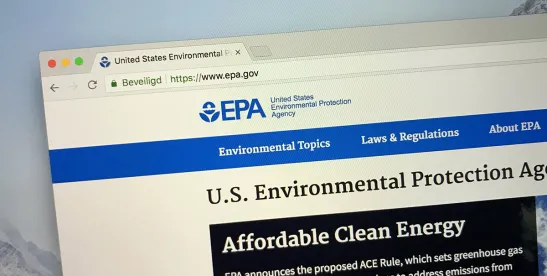The U.S. Environmental Protection Agency (EPA) has long navigated the complex intersection of science, law, policy, and public trust. Under the Trump Administration, EPA faces renewed scrutiny. The Administration seeks regulatory rollbacks and is pursuing a broader deregulatory strategy that many believe risks sacrificing hard won environmental protections in the name of economic growth.
While early promises to reduce bureaucratic red tape struck a chord with a number in industry, implementation has appeared blunt thus far, rather than measured. Deregulatory actions have sometimes resembled sweeping cuts “with a machete instead of a scalpel,” affecting the intended target of outdated or burdensome rules, but taking with it collateral damage including critical administrative safeguards and scientific functions. Although EPA has avoided some of the steepest cuts levied on other federal agencies, many worry that this trajectory will fundamentally impair the Agency’s mission.
EPA Administrator Lee Zeldin has attempted to ease concerns, stating that he can “absolutely” assure the public that deregulation will not harm the environment. “We have to both protect the environment and grow the economy,” he stated when questioned by CBS News’s “Face the Nation” about whether he could ensure that deregulation would not have an adverse impact. Still, the juxtaposition of that reassurance against ongoing efforts to slash regulations leaves many stakeholders uneasy.
At the heart of the Administration’s argument is a broader political philosophy — an intent to upend what it views as “entrenched bureaucracy.” White House spokesman Harrison Fields emphasized in a Statement that the Administration is “prioritizing efficiency; eliminating waste, fraud, and abuse; and fulfilling every campaign promise.” Critics, however, view these efforts as retributive, undermining institutional expertise, and marginalizing science-driven decision-making. Some demand a clearer upside — what fraud, waste, and abuse has been uncovered and eliminated?
One of the most visible fronts in this deregulatory push is energy policy. A recent Executive Order directs the federal government to expedite coal leasing on public lands, and aims to designate coal as a “critical mineral.” This pivot is being positioned as part of a strategy to meet the rising energy demands of generative artificial intelligence (AI) and data centers that are expected to increase significantly electricity consumption in the coming decade.
Despite this coal-forward rhetoric, more coal-fired power capacity was retired during Trump’s first term than under either of President Obama’s terms. Analysts note that even with reduced climate regulations, coal’s economic competitiveness remains constrained by market forces and state-level clean energy mandates. “You can run all these coal plants without environmental regulations…I’m sure that will save industry money,” energy data analyst Seth Feaster of the Institute for Energy Economics and Financial Analysis recently told Wired. “Whether or not the communities around those places really want that is another issue.”
Meanwhile, the federal freeze on electric vehicle (EV) charging infrastructure funding has disrupted planned rollouts in several states. “It puts some players in a bad spot where they’ve already invested,” states Jeremy Michalek, an engineering and public policy professor at Carnegie Mellon University, in a recent article on the topic. Similar concerns are emerging in the aviation and alternative fuels sectors, where projects relying on incentives from the Inflation Reduction Act (IRA) and Infrastructure Investment and Jobs Act (IIJA) now face sudden funding uncertainty.
Last week, Judge Mary McElroy of the U.S. District Court for Rhode Island, ordered the Trump Administration to reinstate previously awarded funds under both the IRA and the IIJA, underscoring the legal and financial turbulence surrounding the current regulatory landscape. This new normal is unwelcome to most shareholders. In a March 2025 press release about another lawsuit specifically challenging the Administration’s freeze on funding from the IRA and IIJA, Skye Perryman, President and CEO of Democracy Forward, states that “The decision to freeze funds that Congress appropriated is yet another attempt to roll back progress and undermine communities. These actions are not only unlawful, but are already having an impact on local economies.”
Meanwhile, in a recent post on TruthSocial, President Trump invited companies to relocate operations to the United States, promising “ZERO TARIFFS, and almost immediate Electrical/Energy hook ups and approvals. No Environmental Delays.” But for regulated entities, states, and federal partners navigating a rapidly shifting policy environment overseen by a new Administration that has diminished and fractured its workforce and shown a propensity to backpedal from bold claims, the promise of speed may not be worth the cost of lost clarity, stability, and long-term sustainability.



 />i
/>i
